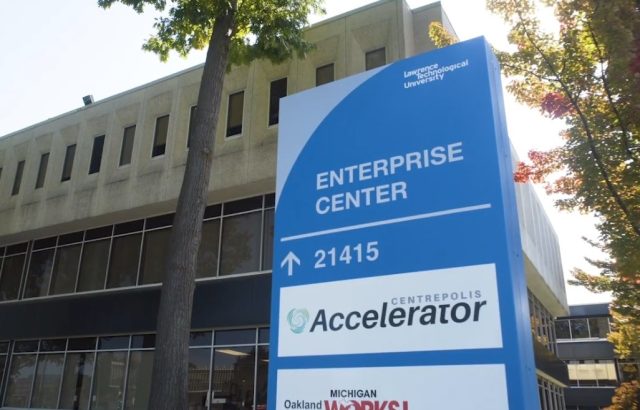[ad_1]
SOUTHFIELD—The Centrepolis Accelerator at Lawrence Technological University has been awarded $2,28 million through the Critical Minerals Grant program, part of Gov. Gretchen Whitmer’s Fiscal Year 2024 budget.
This funding, provided by the Michigan Department of Environment, Great Lakes, and Energy (EGLE), supports Centrepolis’ efforts to advance innovative solutions for the recovery and recycling of critical minerals, particularly from end-of-life batteries.
The project, “Autonomous Disassembly and Sorting of Batteries,” represents a major step toward reducing Michigan’s reliance on the extraction of new materials, while enhancing the state’s leadership in clean energy and sustainable technologies.

Centrepolis Accelerator will use the funding to develop Artificial Intelligence driven automation technologies that streamline the disassembly, sorting, and processing of batteries, improving the efficiency and safety of critical mineral recovery. By automating these processes, Centrepolis aims to increase the purity of recyclable materials, making battery recycling more efficient for consumer products, electric vehicles, and other sectors. The technology will help shape the future of battery recycling, addressing a critical need in the transition to clean energy and a circular economy.
“This grant allows us to push forward cutting-edge AI and robotic solutions to enable for financially viable in Michigan and at the same time help reduce our dependence on raw material extraction,” said Dan Radomski, CEO of Centrepolis Accelerator. “We have put together a world class team led by LTU’s College of Engineering robotics faculty with AI and automation technology companies and Michigan recycling firms. This project addresses a major national security concern as the United States imports most of our battery materials used for domestic battery cell production facilities from China and other parts of the world. It is critical that we secure end of life batteries and reprocess them in a cost-effective way to enable a local source of minerals that can be used again in Michigan and other domestic battery cell production operations.”
“Building a sustainable economy requires ingenuity and innovation from our scientists, entrepreneurs, and businesses,” EGLE Director Phil Roos said of the Centrepolis award as well as grants to the University of Michigan ($1,485,037) and Michigan State University ($706,015). “EGLE’s Critical Minerals Grants will support research and demonstration projects at our universities aimed at strengthening Michigan’s supply chain for the critical minerals needed for clean energy production while protecting our world-class land, air, and water resources. This is an important step in driving a more circular, sustainable economy.”
Added Nabil Grace, LTU senior vice president for research: “This grant will significantly help the state of Michigan, and our faculty members are well experienced in this kind of battery technology. Our faculty and students, graduate and undergraduate, are extremely excited about this award, and stand ready to achieve the goals of this proposal.”
LTU faculty members involved in the research include James Mynderse, associate professor and Guarav Singh, assistant professor, both in LTU’s A. Leon Linton Department of Mechanical, Robotics, and Industrial Engineering, and Yawen Li, associate professor and chair of the LTU Department of Biomedical Engineering.
Said Mynderse of the grant: “This award will leverage LTU’s automation experience to tackle a critical weakness in the domestic battery production supply chain. We are excited to work our industrial partners to advance the state of battery recycling and provide valuable experience to our students.”
Centrepolis will be supported by several key partners, each contributing unique expertise:
- UHV Technologies will provide a fully operational AI-automated battery sorting system to autonomously sort post-consumer and end-of-life EV batteries by type, size, and chemistry.
- Molg AI will contribute elements of an AI-driven automated micro-factory, enabling Centrepolis to test and prove the autonomous disassembly of end-of-life EV battery modules.
- Munro & Associates will benchmark existing manual disassembly processes, ensure safe disassembly, and perform techno-economic analyses comparing manual and automated systems.
- Great Lakes Recycling will serve in an advisory support role and supply end-of-life battery cells and modules and for Centrepolis to test and prove the automated disassembly processes.
- PADNOS will serve in an advisory support role and supply end-of-life battery cells and modules for Centrepolis’ testing of automated sorting and disassembly solutions.
- Goodwill Industries of West Michigan will support the project by advising on and supplying end-of-life batteries of various types, allowing Centrepolis to test and validate the automated sorting technology.
These collaborations will drive Centrepolis’ ability to develop transformative solutions in automated battery disassembly and critical mineral recovery, positioning Michigan as a leader in sustainable energy technologies.
The Centrepolis Accelerator, housed in Lawrence Technological University’s Enterprise Center in Southfield, is 6,300 square feet of business assistance for physical product developers and manufacturing companies, a unique niche among accelerators in Michigan. Clients include climatech, manufacturing startups, and existing companies looking to move up to the next level in product innovation. Services include product design, engineering, and prototyping, as well as business planning services, office space, co-working space, workshops, mentors, and events.
Learn more at www.centrepolisaccelerator.com.
[ad_2]
Source link











